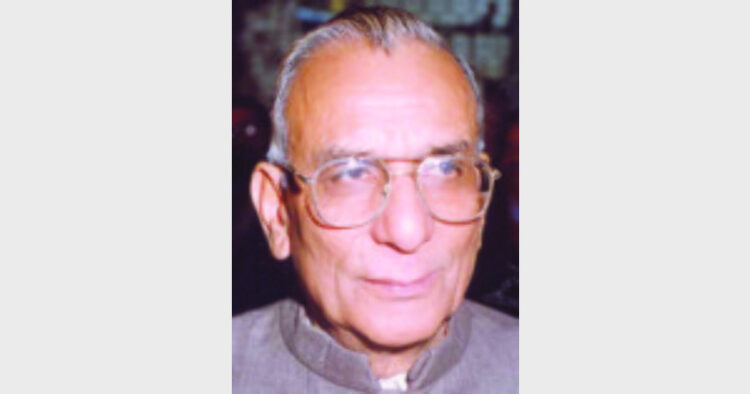Operation Blue Star Memorial sparks sharp reaction, pregnant with dangerous uncertainties
Shyam Khosla
Verdict given by the voters living in urban and semi-urban areas of Punjab in the recently held civic elections is yet another validation of the widely held perception that the national mood is against the Congress. The results also prove that whichever party is strong in the area concerned will gain by Congress voters’ shift away from the tainted and diminished party.
Congress party’s extremely poor show in the elections to four Municipal Corporation, three Municipal Councils and 26 Nagar Panchayats has given a body blow to the party that had lost Assembly elections only six months ago. The plight of the party was exemplified in Patiala – the perceived citadel of the State Congress Chief and former Chief Minister Capt. Amarinder Singh – where it was decimated. It could manage only 8 wards in the 50-ward Corporation. Over all, in four major Corporations – Amritsar, Jalandhar, Ludhiana and Patiala – Shiromani Akali Dal (SAD) surprised everyone by emerging on top with 96 seats followed by BJP with 63. Congress was reduced to the third position with 45 seats, Independents and others got 38 out of 242 wards whose results are out so far.
In Mayoral elections, SAD and BJP are likely to win two each going by their strength in these corporations. In 3 Municipal Councils and 26 Nagar Panchayats, SAD emerged as a dominant party with 244 wards, followed by BJP and Congress winning 28 each and 29 going to others. While SAD Chief and Deputy Chief Minister Sukhbir Singh Badal hailed the verdict as a vote for the development agenda of SAD-BJP Coalition Government, the Punjab Congress president dismissed the results as “murder of democracy accusing SAD of unleashing a reign of terror. Is defeat of the Sonia Congress the same thing as murder of democracy?
A closer look at the results shows that most of the space vacated by the Congress has been captured by SAD. With SAD emerging stronger than BJP in the civic elections, particularly is small towns and semi-urban areas, the sensitive balance in the coalition government may be disturbed leading to tensions between the alliance partners. Some SAD leaders have recently issued provocative statements. Chief Minister PS Badal will rein in over-enthusiastic Akali leaders in the interest of stability of the government he heads. Additionally, alliance’s victory in Municipal elections was preceded by events that have the potential to give space to the radical elements that had propped up a violent separatist movement in the border State.
Laying the foundation for a memorial of “martyrs” in the courtyard of Akal
Takht and paying tribute to those who fell to Operation Blue Star in June 1984 is pregnant with unseemly possibilities. The army action was taken to neutralise armed militants in occupation of the Golden Temple Complex under the leadership of their firebrand leader Jarnail Singh Bhindranwale. The fact that the foundation was laid in the presence of the Akal Takht Chief and the President of the Shiromani Sikh Gurdwara Parbandhak Committee (SGPC) is also significant. SGPC entrusted the kar sewa (voluntary religious service of constructing the memorial) to Damdami Taksal, the seminary that was headed by Bhindrawale. Further, the Sikh clergy honoured Balwant Singh Rajoana, the killer of Congress Chief Minister Beant Singh, by bestowing on him the title of “Living martyr”. Interestingly, Punjab CM had taken personal interest to delay the execution of the convict though the Supreme Court had refused to intervene. Defending the killer of Chief Minister Beant Singh, who had no connection with Operation Blue Star, is beyond comprehension. What had Singh done to deserve this but for fighting terrorism and playing a big role in restoring peace and tranquility in Punjab?
It is, therefore, not surprising, that there is a sharp reaction among intellectuals and the common man in Punjab against these developments. SAD tried to distance itself from these decisions saying it was not involved. It convinced no one. Insiders, however, say SGPC and SAD are unable to resist Damdami Taksal’s radical actions because of the apprehension that it might create a backlash among sections of Sikh community. The BJP has taken strong exception to these moves and said nothing should be done to open old wounds and that the party was committed to fight terrorism in all its forms. Congress leader, Capt. Amarinder Singh, who had resigned his seat in Parliament against the Army action, has also questioned the logic of constructing the memorial 28 years after the tragic event. Lashing out at SAD, the Congress leader accused it of creating “controlled destabilisation”. The people’s anger and anxiety was articulated by a group of prominent citizens of Chandigarh, including senior advocates, academics, former bureaucrats and journalists. The group said the time had come to take pragmatic steps towards closure through the instrument of justice and reconciliation. It expressed its concern that space had been granted for articulation of extremist and divisive views. Punjab had gone through a prolonged period of turmoil and bloodshed. The agony of Punjab is too deep for tears. The people suffered indescribable hardships, trauma and agony in the events culminating to the Operation Blue Star and the aftermath was equally painful. The violence in 1980s ruined State’s economy and strained relations between communities that had Roti Beti relations. Peace and communal harmony returned to Punjab thanks to the vitality and integrity of Punjabis. It is ardent duty of the Government to ensure that no one disturbs peace and amity and the trouble makers are nip in the bud.














Comments